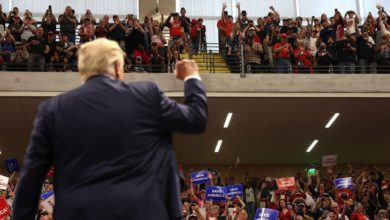Only the Threat of Force Will Stop Putin Going Beyond Ukraine

My son Raimundas completed a Russian course in Moscow as Russia annexed Crimea. Though he had been planning to continue on to a master’s program in England, when he finished the course he returned to Vilnius and joined the Lithuanian Armed Forces. He is a grandchild of deportees to the USSR’s Siberian gulag who were wounded by Russian special forces while supporting Lithuania’s partisan insurgency—which lasted until 1970s. He made the right decision and I was proud. Raimundas, at the time I was Ambassador of the European Union to Russia, could have never imagined that he would need to apply his training in defense of our country from Russians. The calculus is now different. Today Russia invades Ukraine; tomorrow, it might be the Baltics.
[time-brightcove not-tgx=”true”]
The United States of America and NATO support Lithuanians is a source of comfort. As George W. Bush said when we joined NATO: “Anyone who would choose Lithuania as an enemy has also made an enemy of the United States of America.” In the seventy three-years of NATO’s existence, neither the Soviet Union nor Russia has dared to cross the red line. But our history, and the present moment, prove that we cannot be complacent—especially given our understanding of Vladimir Putin. Over the years, I’ve attended several summits and dinners with him and sometimes we chatted informally. The exchanges between us were not remarkable. He was meticulous and well-informed about all aspects of oil and gas policy, particularly regarding extraction sites, supplies capacity, pipeline size and prices. But it is clear at this point that his controlling attention to detail is hostage to violent delusions—not least imaginary Neo-Nazi oppression in Ukraine and his role as savior in a warped missionary tradition.
There was plenty to be warned. In 2016, several people with a close, long-term, personal access to Vladimir Putin told me they were in a “fight for Putin’s mind.” Their aim was to balance his spy-war mentality with attention to Russia’s acute internal challenges; to encourage modernization, investment, and diversification rather than war. Their opponents in this fight were conservative elements of the Russian Orthodox Church and a narrow circle of military and intelligence officials, commonly known as the “siloviki,” who emerged from the KGB and other elements of the Soviet security apparatus. Whether out of convenience or conviction, these men believed Putin had to wage war in order to preserve power in Russia and defend the “Slavic World” from an evil West. Disillusioned of not getting the “equal vote” in the Western institutions under his terms and with no membership prospects in NATO and E.U. for Russia, while hearing about future plans for Ukraine and Georgia to become members of NATO, Putin’s mind went wild.
Learn More: Zelensky Protected Ukraine and United the World
The brutal and unprovoked invasion of Ukraine demonstrates that the fight for Putin’s mind is over. In retrospect, the clearest warnings came from Putin, not a few people within the Kremlin. While his address to the Security Council was more hostile than normal, it still contained much of what he said in 2013 in terms narrative, policy, and aims. The West didn’t want to listen to what he said back then and over the years. It was difficult for me and my colleagues to see the fragile dream of European integration from Lisbon to Vladivostok. So we didn’t respond strongly enough to his escalated threats. Shortly after the 2014 invasion began, I cabled senior colleagues in Brussels, recommending severe sanctions on many of Putin’s closest associates and every member of the Russian Duma who voted for the annexation of Crimea. My colleagues, to my dismay, initially claimed they didn’t see the email. It was frustrating so I sent it out to a wider audience. Europeans didn’t take the initiative. Reactive rather than proactive was our approach.
These mistakes must be avoided again. The E.U. NATO and E.U. have shown their resolve to support the international rules-based system by imposing sanctions. However, there are still many things to do. Russia’s future is in Russia’s hands, but NATO must make every effort to offer a geo-strategic alternative that would be attractive for post-Putin. The E.U. should invite Ukraine to the accession negotiation table. It is an important step. We must also protect our own men and those who are willing to defend the eastern flank. NATO needs to provide more assistance to Ukrainian forces as well as a permanent military presence in the Baltics. We appreciate the assurances that we will support them, but we require American troops on the ground as well as a NATO defense position. Putin is fully aware of the importance of this issue, with even greater stakes. He is currently trying to make Ukraine a vassal country, but he knows that his ultimate goal is to move Russia’s borders westwards as much as possible.




